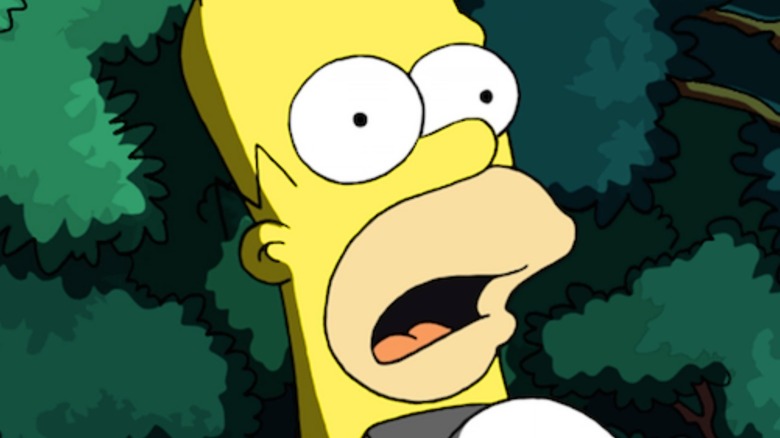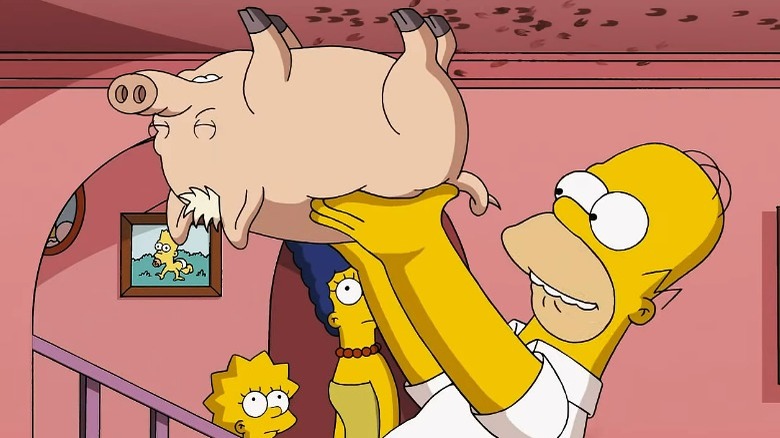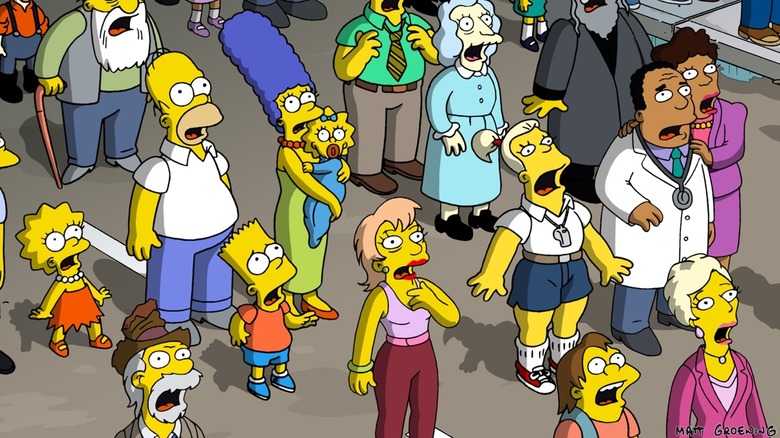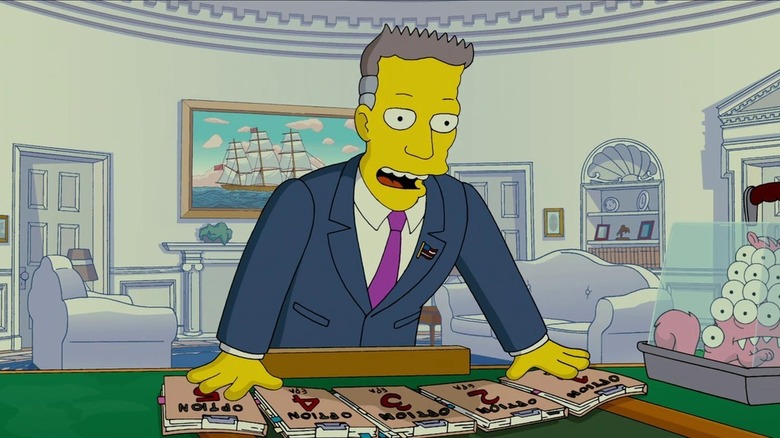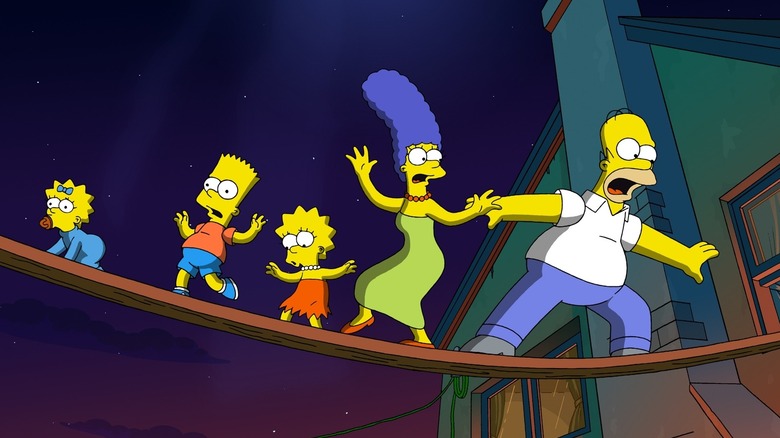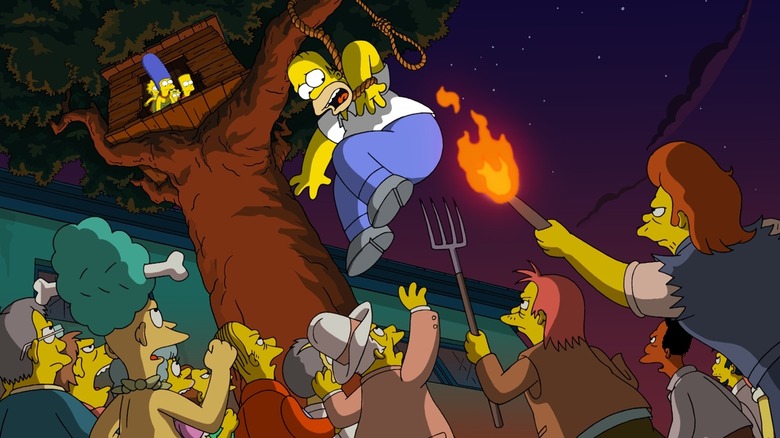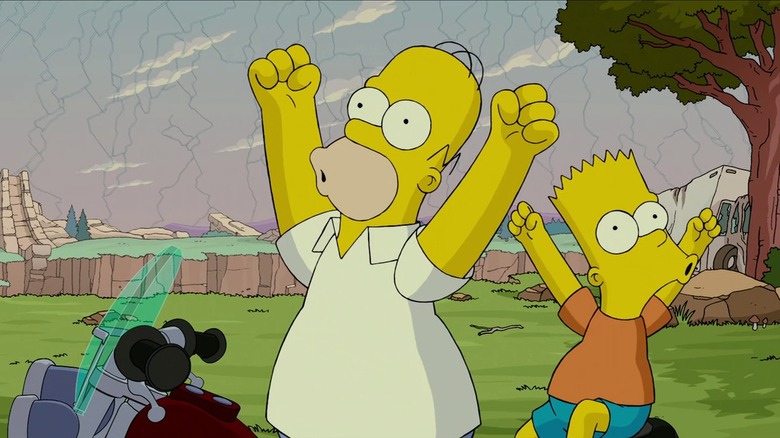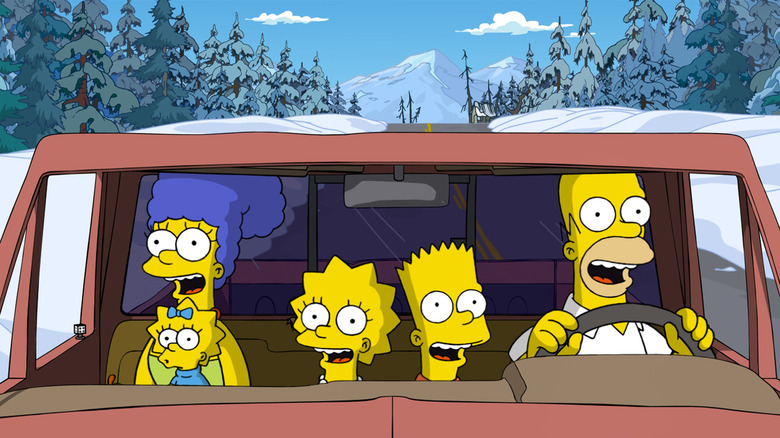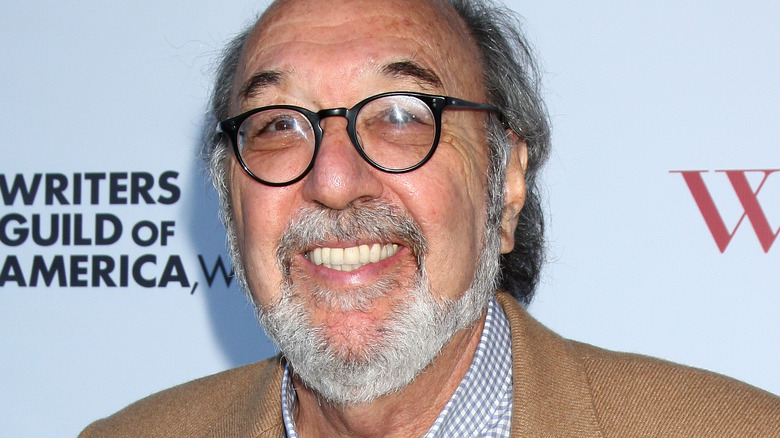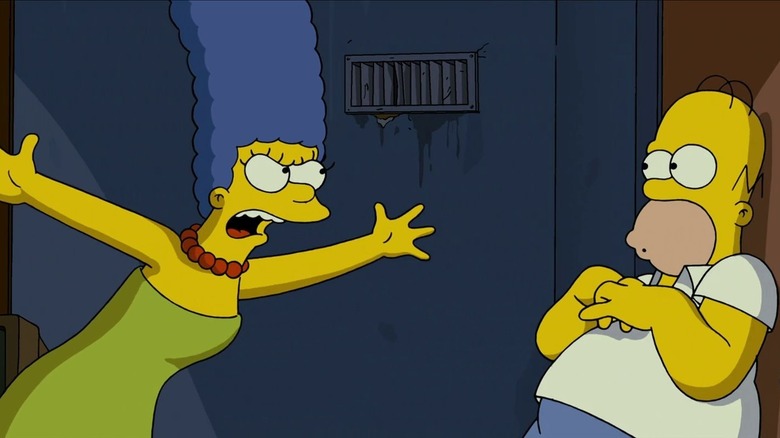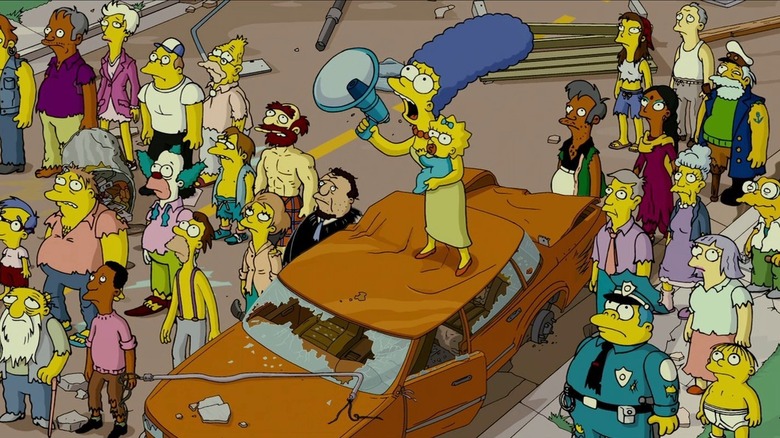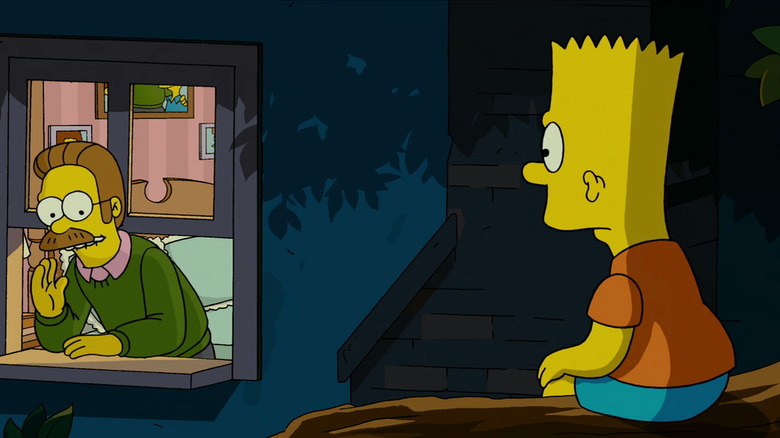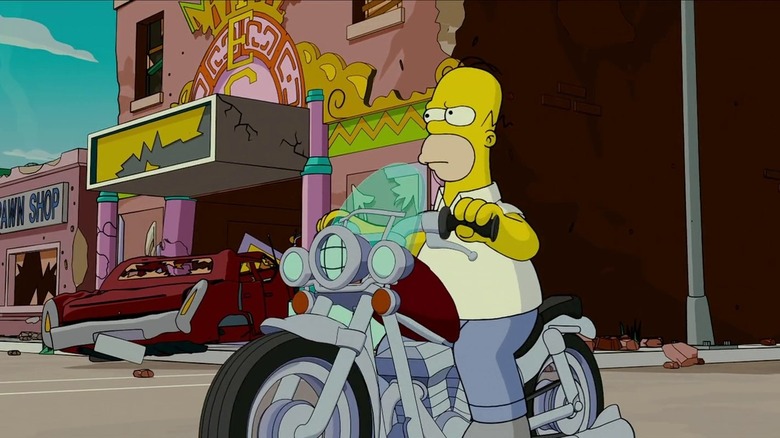The Untold Truth Of The Simpsons Movie
In 2007, "The Simpsons Movie" finally made it into movie theaters across the planet. It took decades before the beloved TV show "The Simpsons" was able to get translated to the big screen, but the wait ended up paying off for both audiences and the creators of this feature. "The Simpsons Movie" was a massive hit critically and financially, impressively leaping over fan expectations rather than getting crushed by them. Given the enormous popularity of both "The Simpsons Movie" and its TV predecessor, it'd be understandable for the general public to imagine that they know every inch of Homer Simpson's first foray into feature-length storytelling.
However, the untold truth of "The Simpsons Movie" is packed full of lesser-known details about this production and how it was brought to the silver screen. Many aspects of this story reflect just how long it took for "The Simpsons Movie" to get realized, in particular early attempts to turn "The Simpsons" into a big-screen attraction. Other elements center on fine-tuning "The Simpsons Movie" so it could be as good as can be, including deleted celebrity cameos and the film's approach to hand-drawn animation.
Even if you know Capital City Goofball from Mr. Costington, you're still bound to discover something new when digging through the untold truth of "The Simpsons Movie."
The earliest attempts to make a Simpsons Movie
Given that "The Simpsons" was a pop culture phenomenon nearly from the moment it began airing in 1989, it should be no surprise that the concept of turning the property into a feature-length movie has also been around for ages. One early notion of bringing "The Simpsons" to the big screen came with the Season 4 episode "Kamp Krusty." In an audio commentary for the episode on the show's 4th Season DVD boxset, artists like Al Jean and Matt Groening recalled how James L. Brooks suggested that "Kamp Krusty" would be the perfect story for a motion picture adaptation of the TV show. However, difficulties in getting the story to sustain the length of a 22-minute episode made the idea of a "Kamp Krusty" film impossible.
One other, more tragic concept for a "Simpsons" movie was a live-action feature based on the character of Troy McClure, with the individual's voice actor, Phil Hartman, reprising the role in a flesh-and-blood capacity. Talking to Jam! Showbiz in 1996, Hartman expressed excitement over the idea of playing a live-action Troy McClure, though the production never came to pass due to, among other reasons, the tragic murder of Hartman. It wouldn't be until well into the 2000s that a concrete idea was formed that could sustain a proper "The Simpsons" Movie, a testament to just how long this production lingered in the halls of development purgatory.
Why Conan O'Brien didn't work on The Simpsons Movie
Before he was a talk show host, Conan O'Brien was one of the most notable writers on "The Simpsons." The man responsible for so many great late-night television sketches and interviews also penned the scripts for some of the most beloved episodes in the show's run, including "Marge vs. the Monorail."
O'Brien departed the show in the early 1990s to host "Late Night with Conan O'Brien," putting his days of "The Simpsons" writing behind him. However, when it came time to make "The Simpsons Movie," the best writers of the program's entire run were re-assembled to craft a screenplay for this project. Given his history with the program, one would naturally assume O'Brien would have to be involved in some capacity.
In a response sent to Entertainment Weekly, O'Brien, after jokingly describing how he was "stunned and disappointed" not to have been asked to work on the movie, noted, in all seriousness, that his lack of participation was likely for the best. He said that his capacity to write scripts for fictional characters like those on "The Simpsons" had "been destroyed" after decades of doing a talk show. "Maybe it's all for the best," O'Brien wrote. Given his success as a talk show host, it's hard to dispute O'Brien's choice to focus on those ventures instead of returning to Springfield with "The Simpsons Movie."
Hank Scorpio almost returned for The Simpsons Movie
In "The Simpsons Movie," Albert Brooks, having already played several guest characters on "The Simpsons" over the years, returns to play a new figure, Russ Cargill. The head of the Environmental Protection Agency, Cargill is determined to keep the contamination that's ruining Springfield under control. His approach to enacting this plan includes putting a dome over Springfield, hunting down the titular family once they escape from the dome, and even blowing Springfield to smithereens. Cargill is, to put it gently, a villainous man, but despite the critical adversarial role he plays in "The Simpson Movie's" story, he wasn't always supposed to be in this feature.
According to The Ringer, when the film was being written, there were initially ideas that the villain of "The Simpsons Movie" would be Hank Scorpio, a pastiche on supervillains played by Brooks in the Season 8 episode "You Only Move Twice." According to the director's audio commentary on "The Simpsons Movie" DVD, though, this plan was abandoned in favor of making an original villain that audiences who'd never seen "The Simpsons" could more easily follow. Though "Simpsons" die-hard fans were deprived of more Scorpio, the vocal performance of Brooks as Cargill was still highly amusing and provided some of the best moments of "The Simpsons Movie."
The Simpsons Movie was almost a musical
Simply due to the lengthy amount of time they remain in production, all animated movies go through drastic changes in their production. Stories evolve, characters come and go, and even entirely new directors can get added to the project. "The Simpsons Movie" was no exception to this norm, with the feature undergoing many drastic overhauls on its road to the big screen. Talking to Time Out, "The Simpsons" creator Matt Groening revealed that "The Simpsons Movie" was initially supposed to be a musical. "The Simpsons" TV program has often featured memorable tunes like "We Put the Spring in Springfield" or "The Monorail Song," so it's no surprise this feature was originally supposed to follow in this musical tradition.
Groening explained that this plan for a musical movie got whittled down over time. Initially, there were plans to "[interrupt] the songs to stop people getting bored," but after that, the various tunes kept getting reduced in length. As the musical numbers got briefer and briefer, Groening and others in charge of "The Simpsons Movie" opted to eschew the tunes altogether. No trace of these musical numbers made it into the final cut of "The Simpsons Movie," though the concept of this project featuring such set-pieces is consistent with tons of classic "Simpsons" episodes.
The Simpsons Movie could've been abandoned at any time
After waiting so long to get the project off the ground, the creative team behind "The Simpsons Movie" did not want the final product to be subpar. This is true of any collection of artists tasked with creating a motion picture, but in this case, the stakes were substantially higher. A lackluster "The Simpsons Movie" wouldn't just disappoint fans, it also ran the risk of tainting the reputation of the still ongoing "Simpsons" TV show. When settling down to finally make this theatrical project a reality, the crew of "The Simpsons Movie" decided to respond to this risk by forcing distributor 20th Century Fox to employ a unique contractual clause.
In an in-depth breakdown by Entertainment Weekly, it was revealed that the crew of "The Simpsons Movie" carried the unique right to shut down production of the movie at any time if it was felt that there was no way that the film could be completed to a high enough standard of quality. A key part of the clause was that Fox could not retaliate or punish the crew for shutting the film down. It was an incredibly risky move on countless fronts, but the Fox studio took a chance and greenlit the movie under such conditions.
In the end, "The Simpsons Movie" did end up not only completed but scoring high critical marks, a reflection that the feature did indeed end up fulfilling the high-quality benchmarks the crew set for itself.
David Silverman left Pixar to direct The Simpsons Movie
In his time working on "The Simpsons," director David Silverman has managed to direct some of the most iconic episodes of the show, including its very first installment, "Simpsons Roasting on an Open Fire," ever to make it to air. His work on episodes like "Krusty Gets Kancelled" or "Homie the Clown" have solidified him as one of the more noteworthy directors in the show's entire run. However, Silverman hasn't just worked on this animated sitcom in his lengthy career. Silverman also worked at Pixar for a lengthy period, during which time he served as one of the co-directors of "Monsters, Inc."
It was during his tenure at Pixar that "The Simpsons Movie" began to gain momentum after years of speculation. Talking to Entertainment Weekly, Silverman recalled how he left Pixar so that his schedule would be open to work on the film. He also noted that Steve Jobs, the former owner of Pixar, told Silverman that if this director had left Pixar for any other reason except his obligations to "The Simpsons Movie," then the man who introduced the world to the iPod would've been furious.
Leaving the studio responsible for making "Toy Story" normally wouldn't be a smart career move. However, going this bold route opened the door for Silverman to serve as the director of "The Simpsons Movie," thus adding another reason for fans to consider him one of the more prolific directors connected to this franchise.
The deleted celebrity cameos of The Simpsons Movie
"The Simpsons" is a TV show well known for being able to grab famous faces to play either original characters or just stylized versions of themselves. Over the years, episodes like "Homer at the Bat" or "The Last Temptation of Krust" managed to snag a slew of celebrities to deliver guest voices, while iconic actors like Meryl Streep, Dustin Hoffman, and Albert Brooks — among countless others — have voiced residents in the wacky city of Springfield. "The Simpsons Movie" continues this tradition by having Tom Hanks and the members of Green Day show up to play heightened versions of themselves.
However, this feature was originally set to contain even more celebrity cameos. A piece from Entertainment Weekly revealed that Erin Brockovich, Minnie Driver, and Isla Fisher all recorded voiceover work for "The Simpsons Movie," either as original characters or versions of themselves, that got axed. Per the audio commentary on the DVD for "The Simpsons Movie," Edward Norton also recorded voicework for a Springfield citizen who gets squashed when the dome first comes over the town. However, Norton's version of the character employed a thick Woody Allen impression that proved so pronounced that the character was eventually re-recorded with Dan Castellaneta.
While "The Simpsons" is famous for its use of celebrity guest stars, that doesn't mean every proposed or recorded celebrity voice-over turn for "The Simpsons Movie" made it into this title's final cut.
How Hans Zimmer got welcomed into the world of The Simpsons
For decades, the composer of "The Simpsons" on television was Alf Clausen. Having been there from the very start of the show, Clausen was an indispensable creative spirit on the program and helped to craft some of the most memorable musical number digressions on the program. as remembered by The Washington Post. Given his long-standing commitment and connection to "The Simpsons," it wouldn't have been unreasonable to assume that Clausen would return to compose the score for "The Simpsons Movie." However, those duties would end up going to a total newcomer to the world of Springfield — Hans Zimmer.
Per The New York Post, Zimmer's participation in "The Simpsons Movie" came through James L. Brooks. The duo had worked together in the past and had formed a solid relationship. When it came time to pick a composer for "The Simpsons Movie," Brooks opted to bring Zimmer into the fold. Zimmer noted that his approach to crafting this score was to find some small ways to be consistent with the musical sound of the original show. However, he also wanted to make sure it offered up something different, like how "The Simpsons Movie" score sometimes "[stepped] on" jokes or dialogue, in contrast to "The Simpsons" TV show that paused the music when it was time for characters to speak. This was the kind of decision that allowed "The Simpsons Movie" to have ties to the franchise's past but also carve out a unique identity.
The important presence of James L. Brooks on the movie
While "The Simpsons" is the brainchild of creator Matt Groening, James L. Brooks has also played an indispensable part in the show's run. Forever credited as one of the three "developed by" figures in the opening credits of every "Simpsons" episode alongside Groening and Sam Simon, Brooks has influenced countless episodes of the program and helped to establish an early sense of legitimacy for the production. When it came time to make "The Simpsons Movie," though, Brooks ended up being an especially useful figure due to his experience with projects far outside the realm of Springfield.
Before being an important figurehead on "The Simpsons," Brooks was the director of beloved movies like best picture winner "Terms of Endearment" and "Broadcast News." In talking about the film to Emanuel Levy, writer Mike Scully noted that the extensive experience Brooks had with feature-length narratives came in handy on the film. After all, many of the screenwriters of "The Simpsons Movie" only had experience penning 22-minute episodes of television. Having a veteran of longer-form narratives like Brooks on hand helped to ensure that "The Simpsons Movie" functioned like a movie in its story and inspired the writers to think even more outside the box.
With this impact on "The Simpsons Movie," James L. Brooks reaffirmed his lasting legacy on "The Simpsons" as a pop culture entity.
The complexities of making a bigger-scale Simpsons story
In making a theatrical feature film, the crew behind "The Simpsons Movie" suddenly had way more tools at their disposal than they ever had when working on the "Simpsons" TV program. Talking to Girl.com.au, series creator Matt Groening noted that one new tool at their disposal was time. The abbreviated production schedule for working on a script for an average "Simpsons" episode was no longer an issue on "The Simpsons Movie," where the writers could spend years polishing the screenplay. Once the writing was complete, Groening said that the feature employed "animation that is far more ambitious than anything we've ever done in the past."
Speaking of the animation, director David Silverman said that the expanded budget for visuals on "The Simpsons Movie" had its benefits and drawbacks. While the animators had a lot more room to go big and bold, everyone involved also wanted to make sure the film was visually consistent with its source material. Finding that balance and juggling stylized character designs with deeply human emotional sequences was a challenge — but an exciting one that could only have come from making something in the space of a theatrical motion picture.
The sudden announcement of The Simpsons Movie
"The Simpsons Movie" was gestating for so long that it was long thought to be something that would never come to fruition. In the spring of 2006, though, "The Simpsons Movie" got a new jolt of life through a sudden teaser trailer that, according to BBC, dropped on screenings of "Ice Age: The Meltdown." This trailer confirmed that "The Simpsons Movie" was finally coming and would arrive in movie theaters on July 27, 2007.
The teaser was extremely short and didn't feature any footage from the final film. Instead, it provided an opening where the camera moves across the Superman logo, seemingly teasing a new "Superman" movie before the camera pulls out to reveal that the logo is simply on a T-shirt Homer is wearing. After Homer remarks that he forgot what he was supposed to say, the logo for "The Simpsons Movie" hits the screen before revealing the release date. It was a short teaser, but its very existence was a massively important development for a long-anticipated project.
The box office victories of The Simpsons Movie
As reported by Reuters, 20th Century Fox initially hoped that "The Simpsons Movie" would crack $40 million on its domestic opening weekend. Considering its $75 million budget, that would've been a respectable bow that could've put the film on track for eventually turning a profit. However, the pent-up demand to see these characters on the big screen was much bigger than anyone at the studio could've imagined. On its North American opening, "The Simpsons Movie" shattered all expectations with a massive $72 million opening weekend and a $167 million global bow.
According to Entertainment Weekly, "The Simpsons Movie" shattered several pivotal box office records with this opening, including dethroning "The Lion King" for the biggest domestic bow for a non-CG animated film and pushing past "Mission: Impossible 2" for the largest North American debut for a film based on a TV show. The financial glories for "The Simpsons Movie" weren't even just limited to one exceptional opening weekend either. "The Simpsons Movie" grossed a staggering $527 million in its worldwide run, a massive accomplishment that spoke to just how much of a fanbase the original "Simpsons" show had garnered in its decades on the air.
The Simpsons Movie was a tribute to hand-drawn animation as an artform
By 2007, theatrical hand-drawn animation in the United States was in a funk. Three years earlier, "Home on the Range" was released as the last 2D animated title from Disney until "The Princess and the Frog" arrived in 2009. Other companies like DreamWorks Animation had also gotten out of this artform and CG animation appeared to be the way of the future, per The New York Times. However, "The Simpsons Movie" was, much like its TV show source material, realized through hand-drawn animation. This created consistency across the "Simpsons" media empire, but the presence of this animation style also had extra significance for the artists behind "The Simpsons Movie."
Talking to BBC in 2007, "The Simpsons" creator Matt Groening openly admitted that hand-drawn animation was in a state of crisis at the time. However, he saw "The Simpsons Movie" as a homage to this art form and all its glorious imperfection. For Groening, making "The Simpsons Movie" the rare 2D animated title in a sea of computer-animated projects made this feature a rebel of sorts crusading for the virtues of this long-standing medium of storytelling. "The Simpsons Movie" couldn't reverse all of hand-drawn animation's woes in the 2000s, but it did serve as a reminder of the unique capacities of animation done on pencil and paper.
